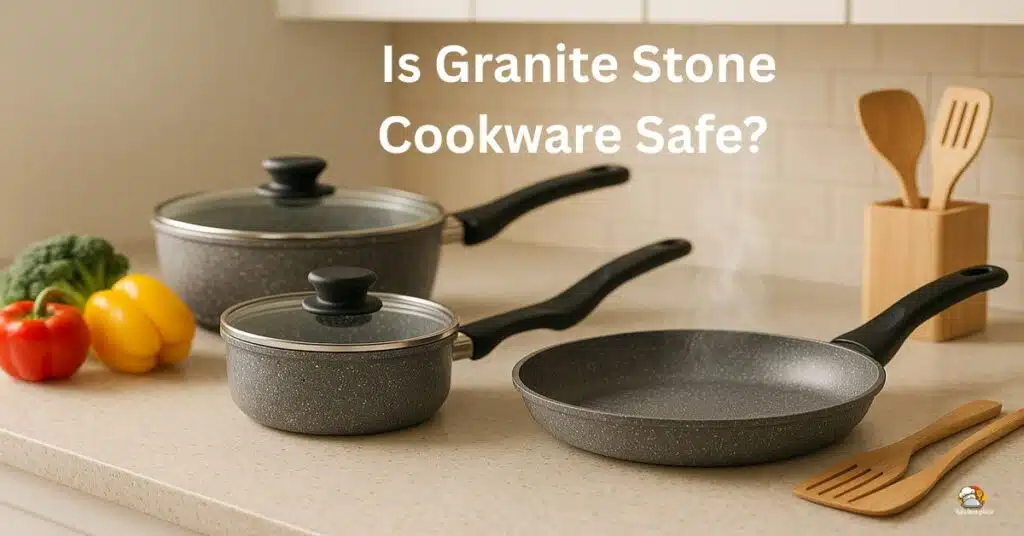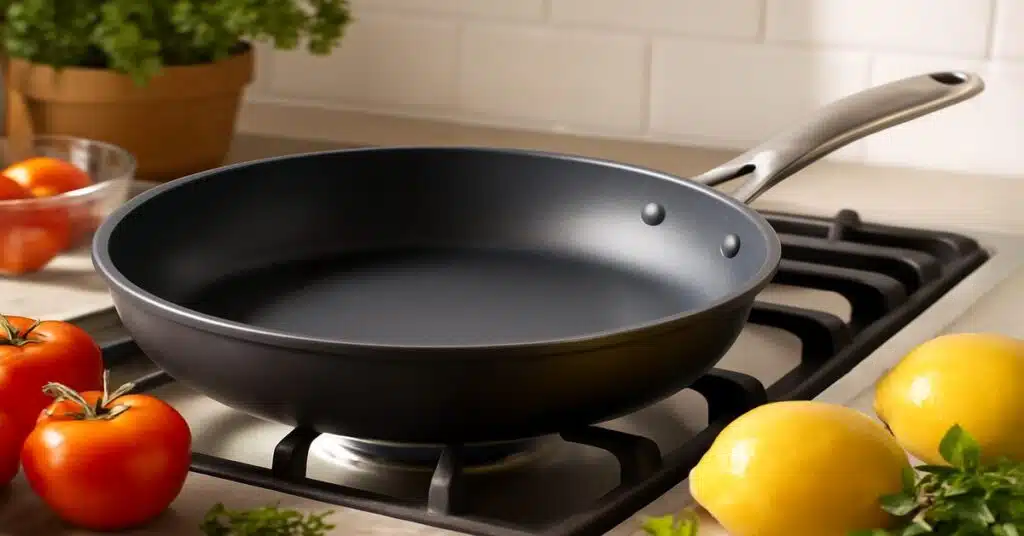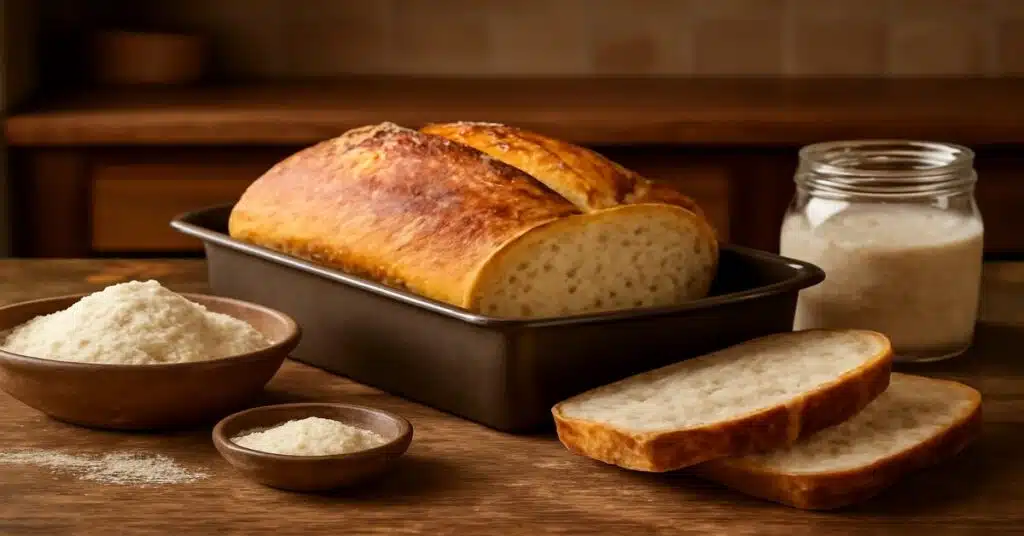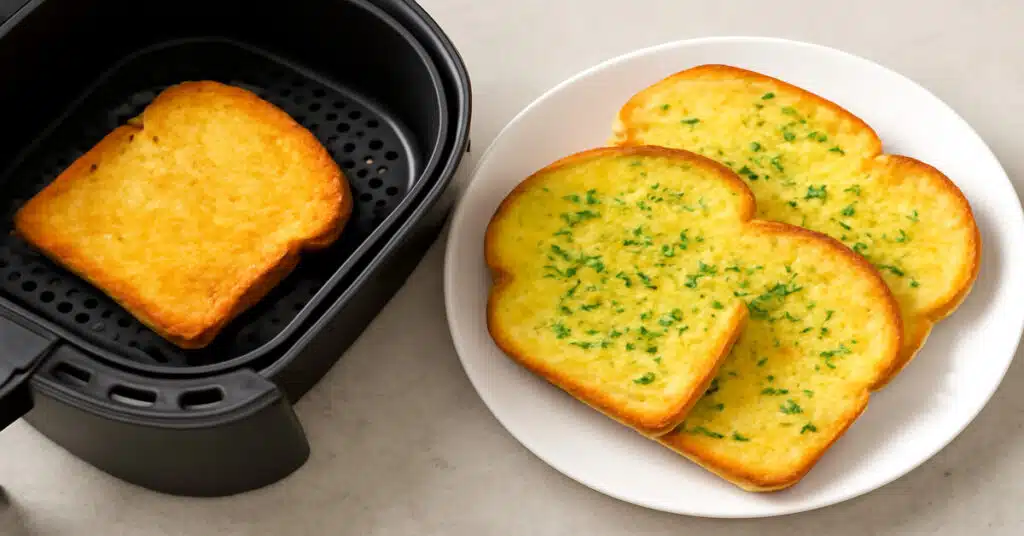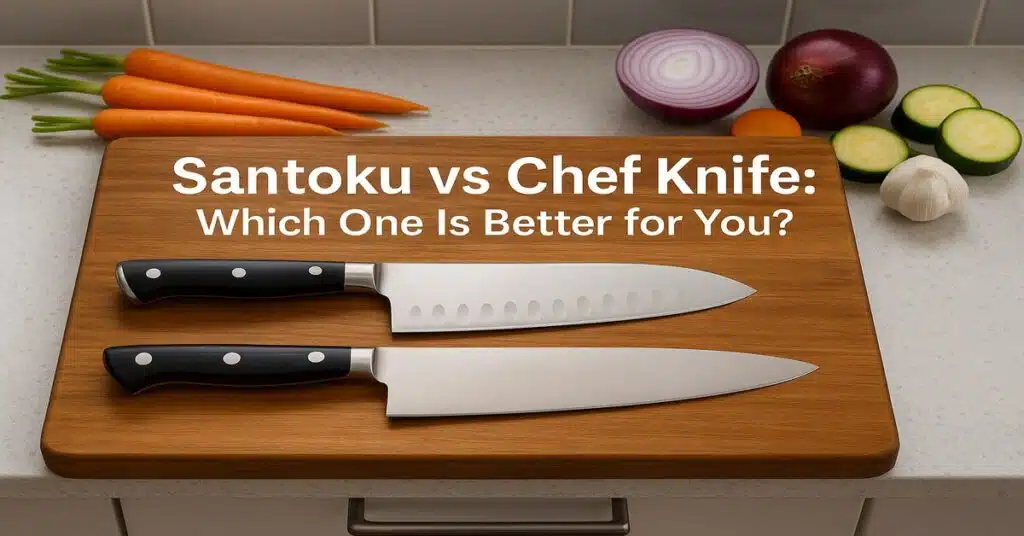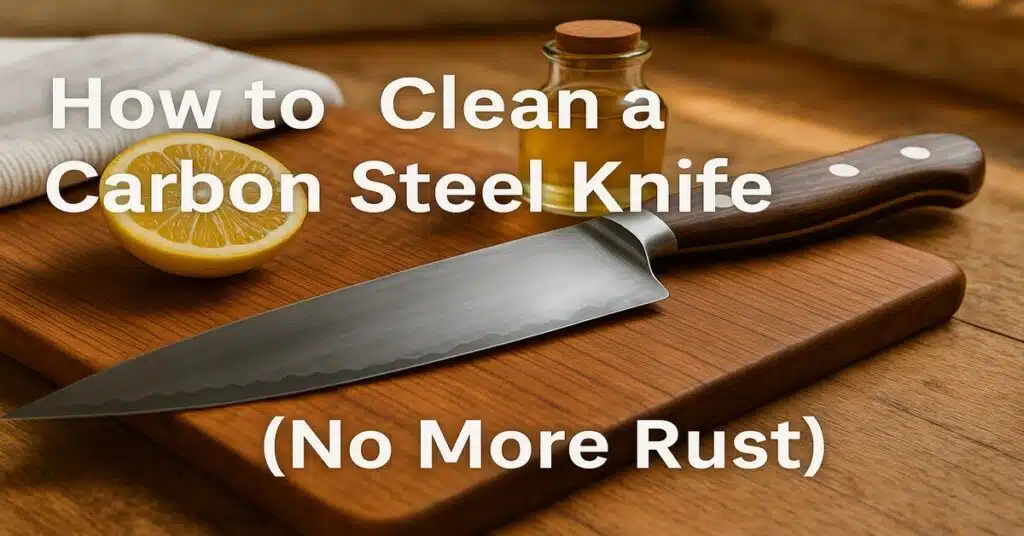My Journey with Granite Cookware
Is granite stone cookware safe? That was the very first question that popped into my head when I held one of those sleek, speckled pans at a store last year. I had just burned my old non-stick pan (again), and I was desperate for something healthier, sturdier, and easier to cook with. As someone who loves cooking and has taught countless friends how to choose the right kitchen tools, I decided it was time to try granite cookware myself.
Yes, granite stone cookware is generally safe for cooking as long as it’s PFOA-free and used at medium heat.
Over the next few months, I used it every single day. I tested it with dry heat, oil, curry, soup, and even baking. I compared it against ceramic, cast iron, and Teflon pans. And today, I am going to share everything—the good, the bad, and the truth. So if you are standing in a kitchen aisle (or online cart) wondering the same thing I did, this guide is for you.
What is Granite Stone Cookware?
Granite stone cookware is a type of non-stick cookware made by fusing a granite-like mineral finish over aluminum or stainless steel. Despite the name, it is not solid granite stone—rather, it is a protective coating designed to look like granite.
In my experience, the outer granite coating gives it a premium look while the inner aluminum body ensures fast heat distribution. According to many granite cookware reviews, it is loved for its lightweight design and stylish appearance. The granite stone coating material is usually free from harmful chemicals like PFOA or PFOS.
Is Granite Cookware Toxic or Safe?

I get asked this a lot: Is granite cookware toxic?
From what I have learned and experienced, the answer is no—as long as you are buying from a reputable brand. Most granite pans today are considered non-toxic cookware options and are labeled PFOA and PTFE free. This means they do not release harmful fumes like some older Teflon pans.
Also, many granite pans are now marketed as lead-free and cadmium-free. So yes, based on research and daily usage, granite stone cookware is safe for your health.
Are Granite Pans Safe to Cook With?
Granite pans are generally safe for everyday cooking — as long as they’re made without toxic materials like PFOA or PFAS. Always check for “PFOA-free” or “lead-free” labels before buying.
Avoid using extremely high heat because it can damage the coating and shorten the lifespan of the cookware.
When used on medium heat and handled properly, granite pans are a durable, non-toxic, and affordable option for daily cooking.
Granite Stone Cookware: Pros and Cons
Granite cookware has both advantages and drawbacks, depending on how you use and care for it.
Here’s what I discovered after six months of daily use — including cooking tests and cleaning results.
✅ Pros:
- Non-toxic and eco-friendly coating (PFOA & PTFE-free)
- Lightweight, durable, and scratch-resistant surface
- Even heat distribution for consistent cooking results
- Easy to clean and looks stylish on any stove
- Safe alternative to traditional Teflon cookware
⚠️ Cons:
- Not ideal for high-heat searing
- Can scratch if you use metal utensils
- Some brands are not oven-safe or induction-compatible
The pros clearly outweigh the cons for most home cooks.
Granite cookware is safe, durable, and a good non-toxic choice for everyday use.
Does Granite Cookware Contain Teflon or Harmful Chemicals?
Granite Cookware Harmful Chemicals
This is where many people get confused.
Some older granite pans used PTFE (Teflon), but most modern granite cookware is free from it. Always check the product label. The granite pan I use is marked “PFOA and PTFE free”, which assures me it is safe.
Also, FDA guidelines state that non-stick coatings are safe when used at normal cooking temperatures (below 500°F).
What Makes Granite Coated Cookware Safe for Health?
Granite cookware is considered one of the safest cookware materials in 2025.
Granite Stone Cookware Safe for Health
Thanks to its non-toxic, lead-free coatings and non-stick surface, it reduces the need for oil and prevents chemical leaching. Also, being a durable cookware option, it doesn’t wear down quickly, which adds to long-term safety.
Is Granite Stone Cookware Good for Daily Cooking?
Absolutely!
I have used granite cookware every day for frying, boiling, reheating, and more. It holds up well, cooks evenly, and still looks fresh after months of use. Plus, it’s easier on the wrist than heavy cookware like cast iron.
If you are cooking daily meals for your family, this cookware will serve you well.
Granite vs Ceramic Cookware: Which One Wins?

Granite vs Ceramic Cookware Safety :
| Feature | Granite Cookware | Ceramic Cookware |
| Safety | Non-toxic | Non-toxic |
| Non-stick | Excellent | Good |
| Durability | Moderate | Fragile coating |
| Weight | Lightweight | Lightweight |
| Cost | Mid-range | Often higher |
From my experience, granite cookware is more practical and easier to maintain.
Is Granite Stone Cookware Dishwasher & Oven Safe?
Granite Cookware Oven Safe & Dishwasher Safe
Not all granite cookware is oven-safe, so always check the label. Mine handles up to 350°F. It is dishwasher-safe too, but I prefer handwashing to keep the non-stick layer intact.
Quick tips:
- Use wooden or silicone utensils
- Avoid extreme heat
Handwash for better longevity
My Honest Thoughts: Is It Worth It?
After months of using granite cookware, granite pans, and granite stone pans, here is my honest take:
This cookware offers a great balance between performance, safety, and appearance. It is ideal for everyday cooks who want a safe and reliable tool without the burden of heavy maintenance. It may not replace every pot you own, but it will definitely be a favorite in your kitchen.
How to Clean and Maintain Granite Cookware?
How to clean granite cookware? Here is what I do:
- Let it cool before washing
- Use warm, soapy water and a soft sponge
- Never scrub with steel wool
- Don not stack it with metal pans
Even if your cookware says metal utensils are safe, I suggest avoiding them to prolong its life.
Granite vs Ceramic vs Cast Iron vs Teflon
| Feature | Granite | Ceramic | Cast Iron | Teflon |
| Safety | High | High | Very High | Medium |
| Weight | Light | Light | Heavy | Light |
| Maintenance | Easy | Moderate | High | Easy |
| Oven Safe | Sometimes | Often | Yes | Limited |
| Non-stick | Excellent | Good | Needs Oil | Excellent |
Frequently Asked Questions
What are the disadvantages of granite cookware?
While granite cookware is generally safe, there are a few drawbacks to consider:
- The coating can wear off if used with metal utensils.
- Some cheaper brands may use low-quality coatings.
- Not ideal for very high heat or induction cooktops.
With proper care and medium heat, these issues can easily be avoided.
Is granite stone safer than Teflon?
Yes, granite stone cookware is generally considered safer than traditional Teflon.
Modern granite cookware is PFOA and PFAS-free, meaning it doesn’t emit toxic fumes even at high temperatures — unlike older Teflon pans.
Which is better, granite or stainless steel cookware?
Both materials have their strengths:
- Granite cookware → non-stick, easier to clean, lightweight
- Stainless steel cookware → more durable, safe for high heat
If you cook delicate foods like eggs or pancakes, granite is easier. For heavy searing or long-term durability, stainless steel wins.
Is Carote granite cookware safe?
Yes, Carote granite cookware is also considered safe as it is PFOA-free, PFOS-free, and made from eco-friendly non-stick coating.
It’s one of the popular alternatives to Granite Stone in the US market.
Is granite stone cookware safe for health?
Yes, granite stone cookware is safe for daily cooking, especially if it’s labeled PFOA-free and PTFE-free. It does not release harmful fumes or toxic chemicals when used at normal temperatures. As long as you buy from a reputable brand, granite cookware is a safe and non-toxic choice for home kitchens.
What is granite cookware made of?
Granite cookware is made from aluminum or stainless steel with a granite-style non-stick coating that gives it a smooth, durable surface. This coating helps prevent food from sticking and makes the pans lightweight and easy to clean. Some premium models also feature PFOA-free and PFAS-free materials for extra safety.
Is granite cookware better than ceramic?
Both granite and ceramic cookware are safe and non-toxic, but they perform differently. Granite cookware is more durable and scratch-resistant, while ceramic cookware provides even heat distribution for delicate cooking. For everyday use and long-term durability, granite cookware generally has the upper hand.
How long does granite cookware last
With proper care, granite cookware lasts about 3 to 5 years before the coating begins to wear off. Avoid using metal utensils, high heat, or abrasive cleaners to extend its lifespan. If handled carefully, many users find their granite pans can last well beyond five years.
Is granite cookware oven safe?
Some granite cookware sets are oven-safe, depending on their handle and base material. Always check the manufacturer’s temperature limit, as most models are safe up to 350–500°F. If the handle is made of metal or silicone, it’s typically safe for baking and roasting in the oven.
About the Author :
MD Soazim is a U.S.-based cookware specialist and kitchen product reviewer at KitchenPluse.com.
He’s passionate about helping readers understand which cookware is truly safe, comparing brands like GraniteStone, Carote, and ceramic cookware through hands-on testing.
His mission is to guide home cooks toward non-toxic, long-lasting, and healthy cookware choices backed by real research and experience.

